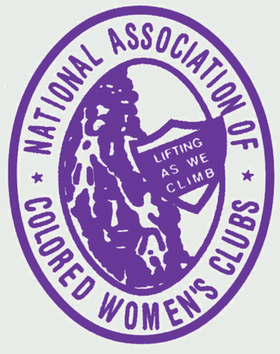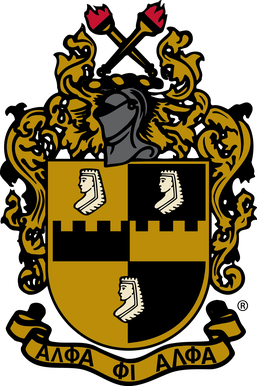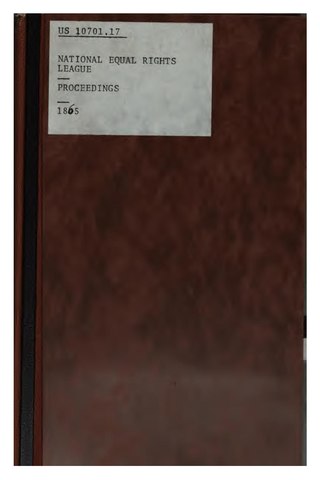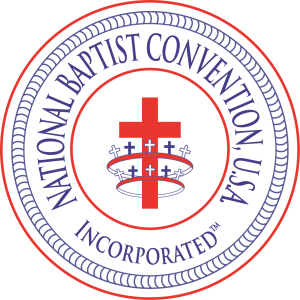
The National Association of Colored Women's Clubs (NACWC) is an American organization that was formed in July 1896 at the First Annual Convention of the National Federation of Afro-American Women in Washington, D.C., United States, by a merger of the National Federation of Afro-American Women, the Woman's Era Club of Boston, and the Colored Women's League of Washington, DC, at the call of Josephine St. Pierre Ruffin. From 1896 to 1904 it was known as the National Association of Colored Women (NACW). It adopted the motto "Lifting as we climb", to demonstrate to "an ignorant and suspicious world that our aims and interests are identical with those of all good aspiring women." When incorporated in 1904, NACW became known as the National Association of Colored Women's Clubs (NACWC).

Mary Terrell was an American civil rights activist, journalist, teacher and one of the first African-American women to earn a college degree. She taught in the Latin Department at the M Street School —the first African American public high school in the nation—in Washington, DC. In 1895, she was the first African-American woman in the United States to be appointed to the school board of a major city, serving in the District of Columbia until 1906. Terrell was a charter member of the National Association for the Advancement of Colored People (1909) and the Colored Women's League of Washington (1892). She helped found the National Association of Colored Women (1896) and served as its first national president, and she was a founding member of the National Association of College Women (1923).

Alpha Phi Alpha Fraternity, Inc. (ΑΦΑ) is the oldest intercollegiate historically African American fraternity. It was initially a literary and social studies club organized in the 1905–1906 school year at Cornell University but later evolved into a fraternity with a founding date of December 4, 1906. It employs an icon from Ancient Egypt, the Great Sphinx of Giza, as its symbol. Its aims or pillars are "Manly Deeds, Scholarship, and Love For All Mankind," and its motto is "First of All, Servants of All, We Shall Transcend All." Its archives are preserved at the Moorland-Spingarn Research Center.
The Association for the Study of African American Life and History (ASALH) is a learned society dedicated to the study and appreciation of African-American History. The association was founded in Chicago on September 9, 1915, during the National Half Century Exposition and Lincoln Jubilee, as the Association for the Study of Negro Life and History (ASNLH) by Carter G. Woodson, William B. Hartgrove, George Cleveland Hall, Alexander L. Jackson, and James E. Stamps, and incorporated in Washington, D.C., on October 2, 1915. The association is based in Washington, D.C. In 1973, ASNLH was renamed the Association for the Study of Afro-American Life and History.

The National Bar Association (NBA) was founded in 1925 and is the nation's oldest and largest national network of predominantly African-American attorneys and judges. It represents the interests of approximately 67,000 lawyers, judges, law professors, and law students.

Lewis Woodson was an educator, minister, writer, and abolitionist. He was an early leader in the African Methodist Episcopal Church (AME) in Ohio and Pennsylvania. Woodson started and helped to build other institutions within the free African-American communities in Ohio and western Pennsylvania prior to the American Civil War.

Betsy Mix Cowles was an early leader in the United States abolitionist movement. She was an active and influential Ohio-based reformer, and was a noted feminist and an educator. She counted among her friends and acquaintances people such as Frederick Douglass, William Lloyd Garrison, Henry C. Wright, and Abby Kelley Foster.
The American Baptist Home Mission Society is a Christian missionary society. Its main predecessor the Home Mission Society was established in New York City in 1832 to operate in the American frontier, with the stated mission "to preach the Gospel, establish churches and give support and ministry to the unchurched and destitute." In the 19th century, the Society was related to the Triennial Convention of Baptists. Today it is part of that Convention's successor, the American Baptist Churches, USA, and is the successor by merger of several 19th century Baptist organizations related to missions and education, including publications (1824), women (1877), and education (1888)

The National Equal Rights League (NERL) is the oldest nationwide human rights organization in the United States. It was founded in Syracuse, New York in 1864 dedicated to the liberation of black people in the United States. Its origins can be traced back to the emancipation of slaves in the British West Indies in 1833. The league emphasized moral reform and self-help, aiming "to encourage sound morality, education, temperance, frugality, industry, and promote everything that pertains to a well-ordered and dignified life." Black leaders formed state and local branches of the league which drew many members, which caused the society to grow quickly, in areas such as Harrisburg, Pennsylvania, where people such as Thomas Morris Chester joined.

William Cooper Nell was an American abolitionist, journalist, publisher, author, and civil servant of Boston, Massachusetts, who worked for the integration of schools and public facilities in the state. Writing for abolitionist newspapers The Liberator and The North Star, he helped publicize the anti-slavery cause. He published the North Star from 1847 to 1851, moving temporarily to Rochester, New York.

The African-American upper class, sometimes referred to as the black upper class, the black upper middle class or black elite, is a social class that consists of African-American individuals who have high disposable incomes and high net worth. The group includes highly paid white-collar professionals such as academics, engineers, lawyers, accountants, doctors, politicians, business executives, venture capitalists, CEOs, celebrities, entertainers, entrepreneurs and heirs.

Harry Thomas Edwards is an American jurist. He served as a United States circuit judge of the United States Court of Appeals for the District of Columbia Circuit from 1980 to 2005, taking senior status in 2005, and a professor of law at the New York University School of Law.
The civil rights movement (1865–1896) aimed to eliminate racial discrimination against African Americans, improve their educational and employment opportunities, and establish their electoral power, just after the abolition of slavery in the United States. The period from 1865 to 1895 saw a tremendous change in the fortunes of the Black community following the elimination of slavery in the South.

The National Association for the Advancement of Colored People (NAACP) is an American civil rights organization formed in 1909 as an interracial endeavor to advance justice for African Americans by a group including W. E. B. Du Bois, Mary White Ovington, Moorfield Storey, Ida B. Wells, Lillian Wald, and Henry Moskowitz. Over the years, leaders of the organization have included Thurgood Marshall and Roy Wilkins.

The American Equal Rights Association (AERA) was formed in 1866 in the United States. According to its constitution, its purpose was "to secure Equal Rights to all American citizens, especially the right of suffrage, irrespective of race, color or sex." Some of the more prominent reform activists of that time were members, including women and men, blacks and whites.

The National Baptist Convention, USA, Inc., more commonly known as the National Baptist Convention, is a Baptist Christian denomination headquartered at the Baptist World Center in Nashville, Tennessee and affiliated with the Baptist World Alliance. It is also the largest predominantly and traditionally African American church in the United States and the second largest Baptist denomination in the world.
The First National Conference of the Colored Women of America was a three-day conference in Boston organized by Josephine St. Pierre Ruffin, a civil rights leader and suffragist. In August 1895, representatives from 42 African-American women's clubs from 14 states convened at Berkeley Hall for the purpose of creating a national organization. It was the first event of its kind in the United States.

The National FFA Organization or FFA is an American nonprofit career and technical student organization, which offers middle and high school classes that promote and support agricultural education. FFA was founded in 1925 at Virginia Polytechnic Institute, by agriculture teachers Henry C. Groseclose, Walter Newman, Edmund Magill, and Harry Sanders as Future Farmers of Virginia. In 1928, it became a nationwide organization known as Future Farmers of America.
Deborah N. Archer is an American civil rights lawyer and law professor. She is the Jacob K. Javits Professor at New York University and professor of clinical law at New York University School of Law. She also directs the Center on Race, Inequality, and the Law and the Civil Rights Clinic at NYU School of Law. In January 2021, she was elected president of the American Civil Liberties Union, becoming the first African American to hold the position in the organization’s history.
Bertha Louise Douglass was an American civil rights activist and lawyer who was the second African American woman admitted to the Virginia State Bar.














